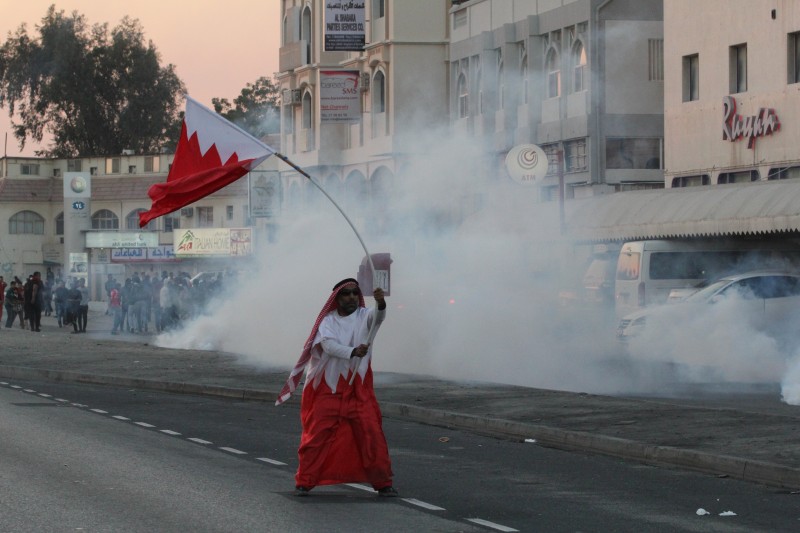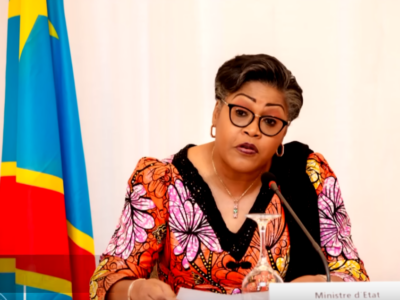
Karranah, Bahrain. 15th February 2014 — Renewed clashes after protesters crawled to the Pearl Roundabout. Demonstrators marched towards the Pearl Roundabout, which was closed three years ago by the forces of order. Security forces dispersed the crowd with tear gas. Photograph by Sayed Baqer Alkamel. Copyright: Demotix
The Bahraini government's credibility is challenged by eyebrow-raising questions with every announcement of some sort of attack against its security forces. Over the past few months, the Interior Ministry declared a number of home-made bomb attacks that targeted police patrols on duty. The most recent was in a village named Karranah, on Budaiya Highway, west of Manama capital city.
This announcement by the Ministry of the Interior on August 28 said a policeman was killed in a “terrorist” blast in Karranah:
One policeman killed in the terrorist blast in Karana. #Bahrain
— Ministry of Interior (@moi_bahrain) August 28, 2015
On Twitter, @Bubahrain challenged the ministry to make public the recordings of the attack.
على طول شارع البديع من كوبري القدم الى منطقة البديع هناك كاميرات مراقبه هل تنشر وزارة الداخليه تسجيل من وضع القنبله #البحرين #تفجير_كرانة
— بو بحرين (@Bubahrain) August 29, 2015
There are surveillance cameras fixed along Budaiya Highway, from the roundabout and up to Budaiya area. Would the Interior Ministry broadcast the recordings to see who placed the bomb?
@Bahrainmomo tweeted to her 39K followers, doubting that the bombing had happened in the first place.
ازدادت التفجيرات تزامنا مع ارسال الحكومة جنود للقتال في الحرب ضداليمن،فكل ضحية يموت هناك يتم صنع سيناريو هنا واتهام المعارضة به #تفجير_كرانة
— أم أحمد (@bahrainmomo) August 28, 2015
The (number of) bombings increased as the government sent troops to fight in the war on Yemen. So for every victim who dies there, a scenario is made up here to accuse the opposition.
Alya Radhi questioned:
بعد تفجير #الكويت انتشرت صور الانفجار و المصابين والشهداء في موقع الانفجار بالصورة والفيديو لماذا لم نشاهد هذا في #تفجير_كرانة
— Alya Radhi (@ALYARADHI) August 29, 2015
After the Kuwait blast, pictures of the bombing, the wounded and the martyrs were shared in photo and film. Why have we not seen this in the Karranah blast?
The KarranahNews account on Twitter, which has 62K followers, cited the wide absence of confidence in the government.
وفوق ذلك ندعو لجهة تحقيق محايدة بشأن التفجير فلا نثق بما يحكيه النظام ضد الشباب والأهالي فالنظام جهة غير محايدة #bahrain #تفجير_كرانة
— شبكة كرانة الإخبارية (@KarranahNews) August 28, 2015
On top of this, we call for a neutral inquiry body (to investigate) the bombing, we have no confidence in the stories told by the regime against the youth and people. The regime is not a neutral side.
Bahrain has been rocked by wide protests for political reform since the so-called Arab-Spring spilled over from Tunisia to other parts of the Arab world. The massive nonviolent protests that once filled main streets have been repeatedly banned since the opposition boycotted the parliamentary elections in December 2014. Smaller nightly protests are contained inside residential areas today.
Of course, troublemakers who want to turn peaceful uprisings into violent movements can be found just about anywhere. So whether these bomb attacks are real or not remains a puzzle, with the government ignoring calls to allow an international body to open investigations into the deaths of the policemen.
In this context, the Ministry of the Interior is also being slammed for its obvious biased position from the victims of the political crisis that undermined the security situation in the country. Soon after the blast, the ministry announced a number of arrests.
Ahmed Alsaffar commented:
بعد 24ساعه تم القبض على اكثر من 20شخص مشتبه بهم!! اكثر من سنتين ولغاية اليوم لم يقبض على قاتل الشهيد احمد اسماعيل. #تفجير_كرانة #bahrain
— Ahmed Alsaffar (@Asaffar1984) August 29, 2015
After 24 hours, more than 20 people have become suspects!! Over two years and to date, the killer of the martyr Ahmed Ismail has not been arrested yet.
Ahmed Ismail was killed while filming protest in April 2012.
International news agencies report Bahrain's death toll since 2011 to be at least 65 people, however, rights groups believe the number is much higher.
Leading opposition group Al Wefaq issued a statement condemning the attack.
Human Right First's Director Brian Dooley expected the random arrests that usually follow such news, and also highlighted the Bahraini judiciary's lack of integrity shown over the past years.
In the coming hours we can sadly expect to see a roundup of those the government claims are suspects, but the security forces’ reputation for lying and fabrication means there is virtually no chance of a fair trial or due legal process for those arrested. That, in turn, will likely further polarize the country and lead to greater unrest
Bahraini journalist Nazeeha Saeed reported arrest of three photojournalists right after the blast took place.
Arrest of a number of Costa cafe riders in Karana, including photographers @Alshaikh_BH and Ahmed Al-Fardan and Riad Al-Qallaf #Bahrain
— Nazeeha Saeed (@nazihasaeed) August 28, 2015
The photojournalists, who were rounded up from a coffee shop close to where the blast took place, were held for a few hours for questioning and later released.
Cases like this one have usually ended in death sentences despite international outcry, as Bahrain is listed among countries that issue death sentences based on confessions extracted under torture and ill-treatment.







2 comments
Excellent article.